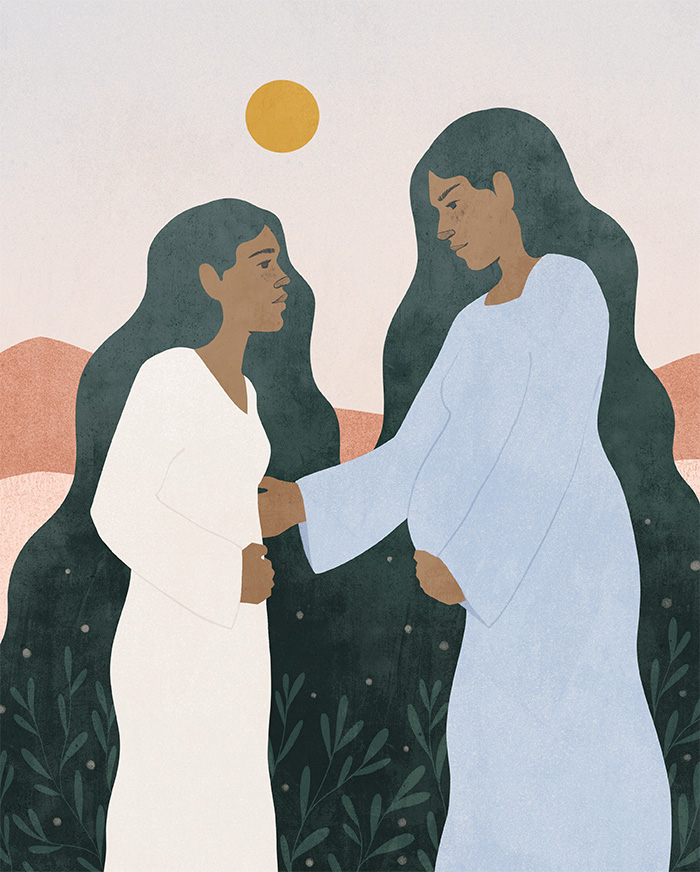
Portland Magazine
April 1, 2022
Story by Karen Eifler
Illustration by Madeline Martinez

TWO HUNDRED YARDS from my house is one of the most consistently joyful places on this planet: a dog park. We’re regulars there, along with our cowabunga terrier, Pippin. If all that unleashed canine exuberance somehow fails to restore my soul, Bear does it. Bear is an affable St. Bernard, approximately the size of a Buick, who performs a singular ministry at Arbor Lodge Park most early evenings. She plops herself in the middle of the grassy area, lays on her back with her I-beam legs straight up in the air, and stays that way while the assembled little dogs jump and crawl on and over her, leaping through those legs as if she is the shaggy dog equivalent of a kid’s monkey bars. Bear is absolutely still, her soulful eyes closed for the entire time. Big dogs know not to mess with Bear or interfere in any way with the imps rollicking in their Bear-time. Some interior gong goes off after a half hour or so, the signal for Bear to gently roll over, stand up, engage in a goober-filled shake-off, then amble back to her person for the walk home.
Numerous Bears in my life keep me striving for the classroom that can be, the committee that can be, the Church that can be. They are people who appear to move through life as stately cruise ships when I am more like a frantic little dinghy flailing in undisciplined circles out in open water. A single wise word, a perfectly timed cocked eyebrow posing the silent question are you quite sure that is the best action to take at this particular moment?, a hand placed on my arm before I spew a Vesuvius of words—these quiet gestures keep me safe from myself, which in turn keeps me from antagonizing the big dogs out there. Outside the public eye, the Bears of my world provide me with secure play structures to incubate promising projects, heal old wounds, ponder stretches in novel directions.
Lake Sagatagan at St. John’s University in Minnesota is a place where I get my bearings annually, kindness of my godfriend Eva, who has a few years and oceans of wisdom on me. I save up a year’s worth of slights, inchoate ideas, and thwarted plans and unfurl them to her gentle ears. We always know it’s coming, and it’s always by her invitation that we pack a lunch and take that walk to the little bench by the water, and she always asks, “So tell me how it is with your soul.” And I tell her, with the same unfocused intensity I witness as Pippin clambers over Bear. And Eva listens, and she invites me to clarify, and she sits with my undisciplined thoughts as they stream around her, and she listens some more, and sits a bit longer, and we are quiet for long stretches that don’t feel awkward. And at some point, the gap between what I’ve been doing and what could be more life-giving for me to do narrows, and I have a map for navigating the terrain ahead. And we eat our PBJs and munch our apples and what do you know, one of us snuck in some Oreos, and we savor those while we take in the cardinals that are such a novelty to this Left-Coaster, and the loons, and the Minnesota dragonflies that are so humongous they’re kind of scary, even though they are also quite beautiful. The world seems a lot more manageable.
Mary is rightly revered for her Magnificat declaration: “My soul proclaims the greatness of the Lord, and my spirit exults in God, my savior…” But those words are not, as I often assumed, Mary’s immediate response to the angel Gabriel when he upends her world with the announcement that she is pregnant with the Messiah. Faced with impending consequences that must really seem dire, this unmarried young girl goes to visit her much older cousin Elizabeth to sort things out. I imagine the tearful, silent, and lengthy embrace the two must have greeted one another with, both confronting the end of their worlds as they knew them. It’s only after sitting with Elizabeth, sharing her fears and wondering with her “how on earth will I break the news to Joseph and my parents” and breaking bread together—they are both eating for two now—and after allowing one another breathing and sobbing and laughter and wonder room…only then can Mary give full expression to her acceptance of the miracle occurring within and through her, in the soaring poetry we have come to treasure.
Here’s a toast to our Bears, quiet pillars who allow us to climb all over them, who guide us through their steadfast listening to get our bearings and emerge as our better selves.
KAREN EIFLER directs UP’s Garaventa Center for Catholic Intellectual Life & American Culture. This essay is from the forthcoming collection Near Occasions of Hope: A Woman’s Glimpses of A Church That Can Be, available from ACTA Publications this month.
University of Portland
5000 N. Willamette Blvd.,
Portland, Oregon 97203-5798
503.943.8000
This website uses cookies to track information for analytics purposes. You can view the full University of Portland privacy policy for more information.
